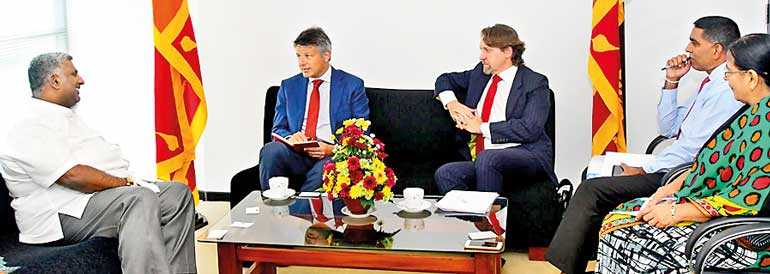Thursday Feb 26, 2026
Thursday Feb 26, 2026
Monday, 20 January 2020 04:15 - - {{hitsCtrl.values.hits}}

By Charumini de Silva
Contrary to speculations, the European Union (EU) has reassured that it will continue the Generalised Scheme of Preferences Plus (GSP+) concessions to Sri Lanka till 2023, while noting that there will be ‘no changes’ in the rigorous monitoring of the country’s progress in implementing the conventions.
This support was conveyed by the EU Mission to Sri Lanka and the Maldives Deputy and Head of Political, Trade and Communications Thorsten Bargfrede when he called on Industrial Exports, Investment Promotion, Tourism and Aviation Minister Prasanna Ranatunga last week.
With the change of Government many speculated that the GSP+ tax concession may come under review by the EU, while there were also concerns that Sri Lanka will be phased out from the scheme as it was categorised as an upper-middle income country mid-last year.
EU representatives pointed out that although the EU has decided to grant the tax relief until 2023, there will be no change in the monitoring process.
GSP+ is granted on the condition of Sri Lanka›s commitment to ratify and effectively implement 27 international conventions on human rights, labour conditions, protection of the environment and good governance. As is the case for all GSP+ countries, the removal of customs duties for Sri Lanka will be accompanied by rigorous monitoring of the country›s progress in implementing these conventions.
During the discussion it was noted that apparel sector which accounts for over 60% of exports to the EU has benefited the most through the GSP+ concession.
As of 2018 as much as 58% of all Sri Lankan exports benefit from some form of preferential access due to GSP+ and the EU remains the country’s largest export market. Since the resumption of GSP+ concessions in 2017 the value of Sri Lanka’s total exports to the EU market in 2018 recorded a growth of 5% when compared to 2017. As a result Sri Lanka’s GSP+ utilised exports recorded a year-on-year recorded a growth of 1% in 2018.
The Minister pointed out that apparel industry represents about 43% of the country›s total exports, which generates over $ 5 billion foreign exchange to the economy.
Bargfrede also said that investors from EU countries are willing to invest in Sri Lanka.
He called on the Government to consider recommencement of SriLankan Airlines direct flights to EU countries to which Minister Ranatunga said that he has already directed officials to look into it in the immediate future.
The Minister also expressed gratitude of the Government to the EU for its continuous support.
“Being able to export more to the EU has helped Sri Lanka›s economy to develop over the years and create more and better jobs for our people,” Ranatunga added.
Ministry of Industrial Export and Investment Promotion Secretary Mapa Pathirana and Ministry of Tourism and Aviation Secretary Marina Mohamed were also present at the discussion.
In August 2010, Sri Lanka lost its GSP+ concession due to allegations of human rights, resulting in a loss of export revenues till the reinstatement of GSP+ in May 2017. The current GSP+ scheme is in place until the end of 2023.
GSP+ aims at supporting Sri Lanka›s economic development through more trade with the EU, as well as contributing to diversifying exports and attracting investment.
Meanwhile, a trade expert opined that the EU only allows countries to have GSP+ access for two years after they reach upper-middle income status with a grace period of one more year before countries are typically removed from the program. In addition the EU could within the next year and a half revaluate the their preferential access schemes including GSP+, which could result in unexpected challenges for Sri Lankan exports.
At present there are eight GSP+ beneficiaries which include; Armenia, Bolivia, Cape Verde, Kyrgyzstan, Mongolia, Pakistan, the Philippines and Sri Lanka.